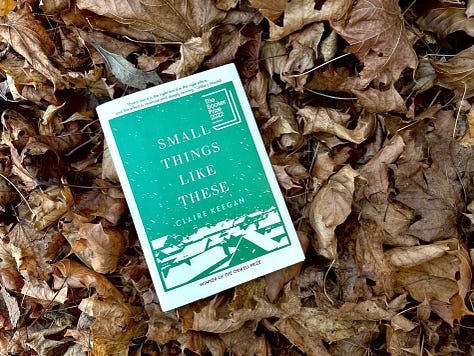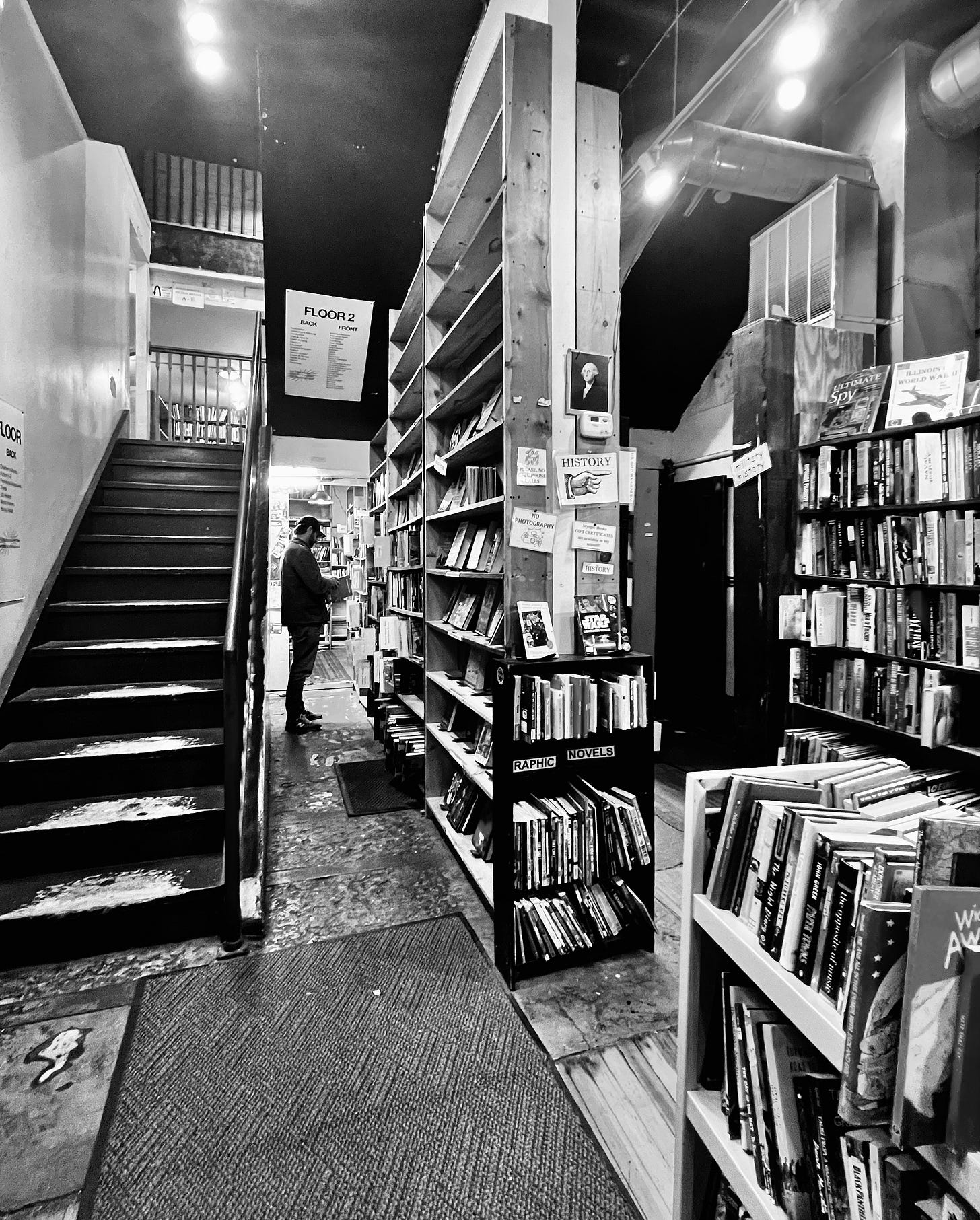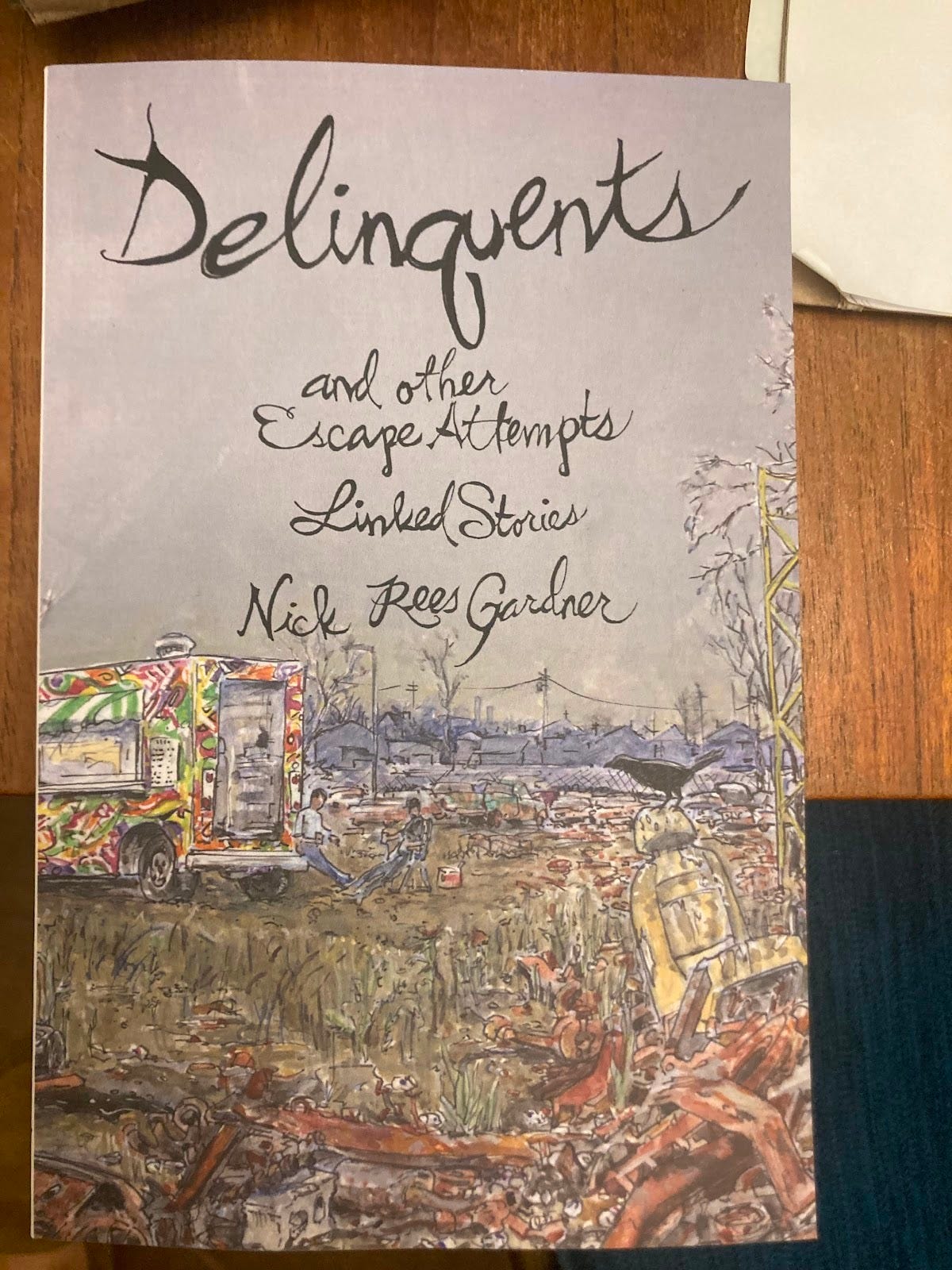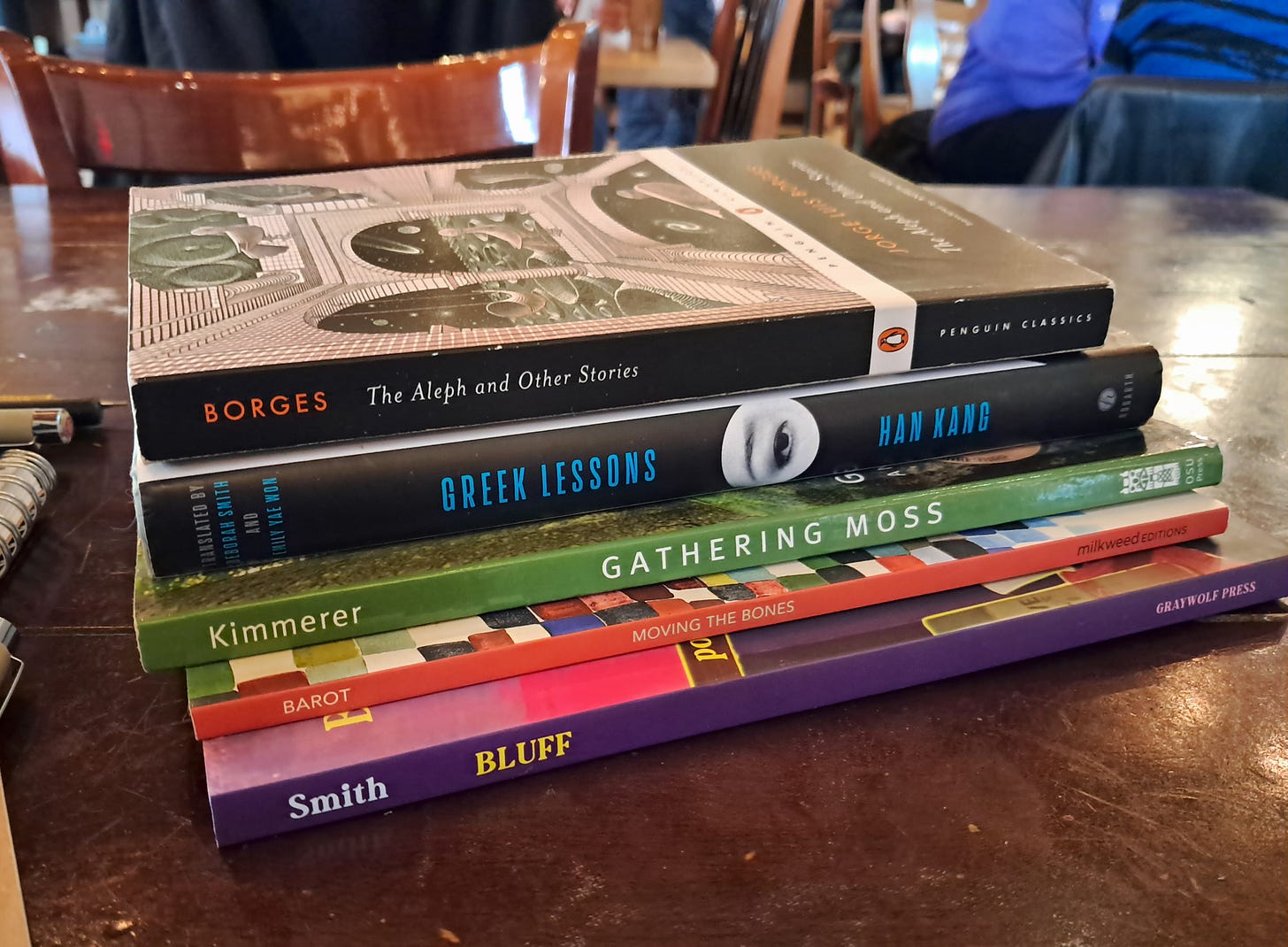Piles stack and spill, haunt and heckle. What to read next? There are so many books, and we’re all getting closer to death by the minute, so how do we cram it all in? Lately, I’ve been choosing books based on connection—with a friend or writing peer—rather than personal whim and obsession, which usually let me down anyway. I build up a kingdom of expectations around certain books, and when I finally ride into that kingdom, it crumbles around me as I roam around its interior walls. But with friends and book clubs and potential connections with real-live humans, I never regret reading even a mediocre book because it can lead to conversations I might not’ve had. I think I’ll order half these books below or hold them at my library, and I hope you do, too, and then I hope you find the recommender and reach out to them and thank them or otherwise engage them, because in the world of right now, our reaching-out muscles seem to have atrophied. So, here’s to gathering strength — with books, yes, with thoughtful considerations, yes, with leaning into our individual loves, yes, but, hopefully, more so, with each other. We might need that strength in the coming years. Happy reading. Please enjoy these Year in Reading entries from my friends. - Josh
My parents were quite fastidious and resourceful. When I was a child they both worked multiple jobs and were quite clever in finding ways to make ends meet and get ahead. Restoring and reselling antique furniture was one of the ways in which they did this. Our home was rife with glorious pieces of old. In our living room, in the corner by the fireplace, was an old oak hutch with leaded glass doors. It stored my dad’s precious antique book collection. It was here that I first experienced the glory and wonder of adventure and imagination. Gulliver's Travels, Swiss Family Robinson, Hamlet, the poetry of Henry Van Dyke and more, transported me to other worlds. This singular feeling is in large part why I have been an avid reader my entire life. It is a feeling I am continually on the hunt for. In the beginning of this year I stumbled into a book that had a resonant magical effect as that of my childhood reading experiences. That book was The Count of Monte Cristo by Alexander Dumas. It is a book with everything. It completely enthralled me. Romance, betrayal, revenge, mercy, and forgiveness are but a drop in the bucket of tropes expertly explored. It is pure adventure and also delves deeply into the nature of humankind, our proclivities for self preservation and the often conflicting desire for absolution. It is worth every second of time that a tome of its size requires.
I was equally, though differently, taken by a book by Niall Williams titled This Is Happiness. It is a book that, when asked, I have described as plot lite. Nothing really happens. Unless you would call a small town getting electricity for the first time a major to-do. It’s a slow burn. It’s about relationships—with ourselves, our terrain, each other, and ultimately contentment. There are a few pages where the protagonist describes how they came to their concept of love and it leveled me. I have read those four pages dozens of times and each time I gain new gratitude and clarity for this clearly wild thing we do called living and loving. I am now slowly working through the rest of Niall Williams books and finding them equally tender, plot light, and life altering.
There were many other books that enriched me this year. These bear mentioning if only the title:
A General Theory of Love by Fari Amini, Richard Lannon, and Thomas Lewis
The Complete Poems 1927 - 1979 by Elizabeth Bishop
Danny The Champion of the World by Roald Dahl
Pachinko by Min Jin Lee
—Andrew Milstead, proprietor of Milstead and Co. (Seattle, WA)
+++
“Why the fuck can’t I leave!” (pg. 168)
Delinquents and Other Escape Attempts: Linked Stories by Nick Rees Gardner
I’m admittedly a bonehead reviewer of books – no shocker – so when it comes to taking my own temperature on reads I tend to notice durations/diminishments of my enthusiasm. There’s stuff I can’t wait to finish. Shit I can’t finish. And stuff I can’t wait to mail to a friend. Nick Rees Gardner’s superb story collection Delinquents and Other Escape Attempts, out this year from Madrona Books, is definitely the latter. I got so gassed up post-read I immediately ordered a swag bag, to maximize my enthusiasm-laden insufferability. Gardner’s offering of stories does two things simultaneously: thematically stitch together a work greater than its individual parts (even though the stories are bangers in their own right) and model the striking potential of the linked story collection. Delinquents orbits a drug-riddled Ohio city – though the concept of escape velocity, which unifies the book, will be familiar to readers who returned home or never left.
Either way, I’m sending your copy in the mail.
—Mike Itaya, writer & editor of DIRTBAG (Mobile, AL)
+++



Small Things Like These by Claire Keegan
I loved this book because it was so hopeful. Set in the late eighties, a working-class Irishman has a family, a solid job, and a community is put to the test as he pulls on childhood virtues and remembers the kindness others have shown him to then pass along, no matter the consequence. Keegan is such a talented writer, to bring us something so beautiful in only 114 pages! Simple phrases that you want to sit with, and a story that I will remember for years to come. The book is a gift!
Reversed Thunder: The Revelation of John and the Praying Imagination by Eugene H. Peterson
If you grew up with the Left Behind series, this book is for you. It has completely changed how I read and understand the book of Revelation. Peterson gives such a fresh exegesis on John’s writing; everything written in Revelation has already been proclaimed in previous books, the purpose was to evoke the imagination and give hope to the first century Christians. John was using his gifts as a theologian, pastor, and poet.
One Dark Window & Two Twisted Crowns by Rachel Gillig
It would not be my year in books without a romantasy! What a slog to try and find something as good as the realms in Sarah J. Maas and Rebecca Yarros. But! This duology is an absolute treasure. There is a tyrant king, dark magic, a 500-year-old monster, love interests, and characters you absolutely adore. I loved it!
—Dahlia Brue, proprietor of Idun (Saint Paul, MN)
+++
The year started strong. I dove deep into horror, immersing myself in stories by women and BIPOC writers. There’s something about horror—its raw emotional undercurrents and its ability to confront our deepest fears—that resonates profoundly. I found myself unraveling the connections we share with this genre and how it reflects the psyche.
I fell head over heels for Fernanda Melchor’s blistering prose in Hurricane Season and Shirley Jackson's Lottery and Other Stories and worked my way through nearly everything she's ever written—her work is a masterclass in unsettling brilliance. Carmen Maria Machado’s stories, however, left the deepest impression. Listening to her narrate her memoir, In The Dream House, was transformative, adding layers of intimacy and nuance that made her writing even more powerful.
By June, my reading momentum slowed to a crawl. I’d pick up books from my TBR pile—stories I’d been excited to read for months or months ago—only to find myself drifting after a few chapters, a few lines, or even a few words. Nothing seemed to connect, and my enthusiasm for reading waned.
So, I tried to break out of this slump and go wide with my reading like Padgett Powell's, The Interrogative Mood. There were glimmers of magic, like Samantha Hunt’s Mr. Splitfoot, which I couldn’t put down. Yet, my overall appetite for reading continued to diminish. Perhaps the post-MFA blues, a kind of creative exhaustion, made it harder to engage.
Seeking inspiration, I turned to literary events, hoping that hearing authors speak about their craft might reignite my passion. I listened to Leslie Jameson talk about fractured structures for her memoir Splinters, watched Tommy Orange over Zoom talk about writing authentic experiences for Wandering Stars and listened to Percival Everett say he read Huckleberry Finn fifteen times in a row before writing James.
While these experiences were enriching, they didn’t fully jumpstart my reading habits. Craft books didn’t do the trick either. But then I got into audiobooks. I know, I know—some might debate whether they’re “real reading,” but they allowed me to engage with stories in a new way.
Notable Audiobooks for the year:
We Were the Universe, by Kimberly King Parsons
I Who Have Never Known Men by Jacqueline Harpman
Writers & Lovers, by Lily King
Big Swiss, by Jen Beagin
And of course, In the Dream House by Carmen Maria Machado (also read by the author)
Audiobooks became a bridge to my love of narrative, offering a fresh and accessible way to connect with books during a year when my relationship with reading felt...complicated. Sometimes the way forward looks slightly different—and that’s okay.
— Atina Hartunian, writer (Los Angeles, CA)
+++
Disclaimer: I'm a total literary sell-out. My reading list gets shorter every year. I fall asleep to books on audio, binge TV series that I excuse-claim are great writing, and skim-grade the hell out of student stories. I'll never spot the next great American novelist this way, and I know, I know, they're right under my nose (well, straight out from my nose on my stupid screen anyway). I keep filling my bookshelves like I can tsundoku my way into being well-read again, like I can ujjayi-breathe those book dust particles into my lungs. Too tired and overworked, and falling for click-bait titles, my attention span for a sentence has been reduced to fragments, a dangling modifier at best. Still, here's my year-end list of mostly unfinished or aspirational reads.
I've started, and I will soon finish: Till The Wheels Fall Off by Brad Zellar, He's one of my local faves, but his novel is unlike anything else I've read from him. If you raved about House of Coates like I did, pretend Till The Wheels Fall Off is by his weird outta-town cousin, totally different guy, but I'm really loving it. It's an eighties midwest nostalgia tour of roller rinks, record stores, and the dying main street. Zellar speaks straight to my, slap-bracelet-wearin', pickle-sickle-slurpin, gummy-worm-tweezin' heart. I'll be turning the final pages soon and may need to break out the rollerblades one more time.
I started listening to Creation Lake by Rachel Kushner. I'm feeling so-so about it, but it's my book club's first of the year, so I'll push through. Kushner's great, so maybe I just need to get in the right mindset before chipmunking it.
I just read two wild stories from Megan Stielstra's Everyone Remain Calm, and I'm hooked on the absurdist gender stereotypes and unabashed freaky-deaky sexual tensions that play out. One of the characters has recurring rebound sex with The Incredible Hulk between all of her relationships.
I'm totally fascinated by the first couple chapters I read in Appropriate: A Provocation by Paisley Rekdal and How To Read Now by Elaine Castillo. Rekdal's book has me considering my authorial privilege in the world of fiction and Castillo's book has me reframing the way I teach reading in my classes. I'm thinking I might adopt this text in my classes next fall.
I actually fully read: Emily Strasser's Half Life of a Secret with my book club. She graduated from the University of Minnesota, and she was my colleague for a bit at Century College before moving east. I probably feel some undeserved hometown pride with this one. It takes a literary village, right? Anyway, Strasser's research into her family history and her grandfather's work as one of the scientists who built the first atomic bomb was so astute and critical yet tender and full of care. I really am honored to have shared literary community with Strasser and her book for the time she called Minneapolis home.
I also read American Precariat: Parables of Exclusion, edited by some wildly talented writers from the Minnesota Prison Writing Workshop. This collection is ground-breaking thematically but even more so in terms of its publication process. To empower incarcerated writers to curate and edit essays that explore class and caste systems feels nothing short of revolutionary. Between each essay, there's a behind-the-scenes conversation with the editors that is just as enlightening to read as the essays themselves. Isn't inclusion the most obvious way to reject exclusion?
I had the pleasure of interviewing Nathan Hill when The Nix came out some years back, so I was quick to put Wellness on my shelf, and it's one of few that didn't collect any particles of dust. I loved this book so much. Loved. Loved. Loved. Doesn't this make you want to puke?
"And so here they are, lingering in the shadows. Outside, the snow falls plump and quiet. Inside, they are alone in their separate little studios, in the crumbling old buildings. Both their lights are off. They watch for the other's return. They sit near their windows and wait. They stare across the alley, into the dark apartments, and they don't know it, but they're staring at each other."
Stalkers! Ugh, they deserve each other. It's disgusting, I know, but who didn't fall for it? I did. I just fell in love with Jack and Elizabeth's love story, and then I fell in love with Hill's love for story. And you know, I just don't care if it was all placebo all along. I'll read it again and again, and I'll fall for it every time.
I also read and loved Natalie Cohn's The Braille Encyclopedia, Once I Was Cool by Megan Stielstra, Our Strangers: Stories by Lydia Davis, and a whole bunch of novellas to prep for a lit course I taught this fall. I loved Kick The Latch by Kathryn Scanlan, Western Lane by Chetna Maroo, The Little Snake by A.L. Kennedy, and The English Understand Wool by Helen DeWitt. I assigned My Very End of The Universe: Five Novellas-in-Flash and a Study of The Form edited by Abigail Beckel and Kathleen Rooney from Rose Metal Press, Grievers by Adrienne Marie Brown, We The Animals by Justin Torres, and Small Things Like These by Claire Keegan. Loved 'em all. Unloved novellas not mentioned here.
Read for Research: I recently read Valerie Solanas' Scum (Society for Cutting Up Men) Manifesto, which first appeared in 1968. If it rings a bell and you can't place it, she's the chick who shot Andy Warhol. I'm doing a deep dive into manifestos of all kinds for a novel project I'm brewing, and this was one hell of a starting place. I read the edition with a forward by Avital Ronell who makes the case for SCUM's entry into the cult classic hall of infamy. I'm getting what she's laying down, but I'd like to deepen my manifesto research, so please send any and all recs my way.
—Amy Fladeboe, writer, curator, & teaching artist (Minneapolis, MN)
+++
One of the fun things about reviewing a year’s worth of books is discovering thematic patterns we missed in the slow unfolding of the year. As Theodore Roethke said, “We come to something without knowing why,” and looking back, the pattern of our interests becomes more clear. For me: American history and Buddhism come to the top of the list.
American history. How to Hide An Empire lingers still. The history of American influence (political, military) around the globe was never a topic of learning growing up—just the continental states. The Philippines? Secret wars in Laos? The influence of military bases on The Beatles? I didn’t have a clue. Reading this shocks and sobers the political mind; it gives us a wider perspective to appreciate—and critique—a more accurate picture of this country’s history. There’s also Kay Larson’s When the Heart Beats: John Cage, Zen Buddhism, and the Inner Life of Artists. A practicing Buddhist in the art world, Larson’s history of Cage’s life and the emerging modern art scene around him is equal parts biography and spiritual rhapsody. The book—and Cage himself—give us a window of how creative and spiritual wisdom braid together into one American life.
Buddhism. I’m a recovering intellectual trying to get sane and embodied, and for me that’s meant joining a meditation center and educating myself on the tradition, Zen specifically. How the Swans Came to the Lake and Taking the Path of Zen oriented me to American Buddhism. Natalie Goldberg’s memoir Long Quiet Highway: Waking Up in America and Katagiri Roshi’s You Have To Say Something: Manifesting Zen Insight oriented me to local Twin City approaches. And books like The Feeling Buddha and After the Ecstasy the Laundry helped point the way to a psychologically wise and compassionate approach to meditation. There’s a great teaching from the Buddha of a man with an arrow through the heart. What’s better: learning who to blame or the particular shape of the arrowhead or the divine reasons it struck? Or just to take the arrow out? Reading all this and taking first steps down this path has been a relief.
—Michael Wright, writer & educator (Minneapolis, MN)
+++
2024 was a year of great pleasure in reading, and now is the time for pleasure. It appears that for me this meant books about (and of) ambiguity, confusion, care, tenderness, violence, serious thinking, and masculinity. Some of what stuck:
gently, gently by Narinda Heng. Heng is a potter, poet, and climber based out of Oakland. She produces a handmade chapbook once a year. I love her voice, which is clear, tender, and careful. In this year's chapbook, she considers freedom, empire, land, genocide, her Khmer heritage, and human connection, all with a softness I find difficult to access when thinking through such questions of justice, history, and violence. She speaks directly to me.
The Aleph and Other Stories by Jorge Luis Borges. There is so much literary delight in Borges. What landed this time is the wandering and uncertainty, the shuffling around in the dark for facts in a world that he believes, with utter confidence, is more dream than reality, and where our dreams, our stories, are what's real. Things don't end in Borges, they open into fractures and loops, into infinities. Nothing resonated more in 2024.
Two short stories (both freely available online): “The History of Sound” by Ben Shattuck from his debut collection, and “Bartow Station” from Jamel Brinkley’s Witness. Stories of exceeding tenderness about masculinity and love.
Another Word for Love by Carvell Wallace. "We teach each other to hate what we cannot control, and nothing, literally nothing, can be truly controlled." Every living man would benefit from reading this sensitive and intelligent memoir. It has healing properties, but just read it for the beauty.
Favorite novels included:
White on White by Ayşegül Savaş
Greek Lessons by Han Kang
Miranda July reading her own book (thank you, Libby app)
Percival Everett's James (also spoken, a great reader)
Other favorites:
Moving the Bones by Rick Barot, especially this and this
Bluff by Danez Smith
Gathering Moss by Robin Wall Kimmerer
I still very much back my September book(ish) recommendations, for their strangeness.
Here's to more pleasure for us all in 2025!
— Scott Melamed, writer (Minneapolis, MN)
+++
Please support indie booksellers and libraries in your community if you can, or shop online at Bookshop, which allows you to support an indie bookstore of your choosing. I should also mention, if you’re into audio, like Atina, check out the Libro.fm app, an alternative to Audible, which also allows you to support an independent bookstore of your choosing. I use it and love it. Thanks for all your support. See you in the New Year.










